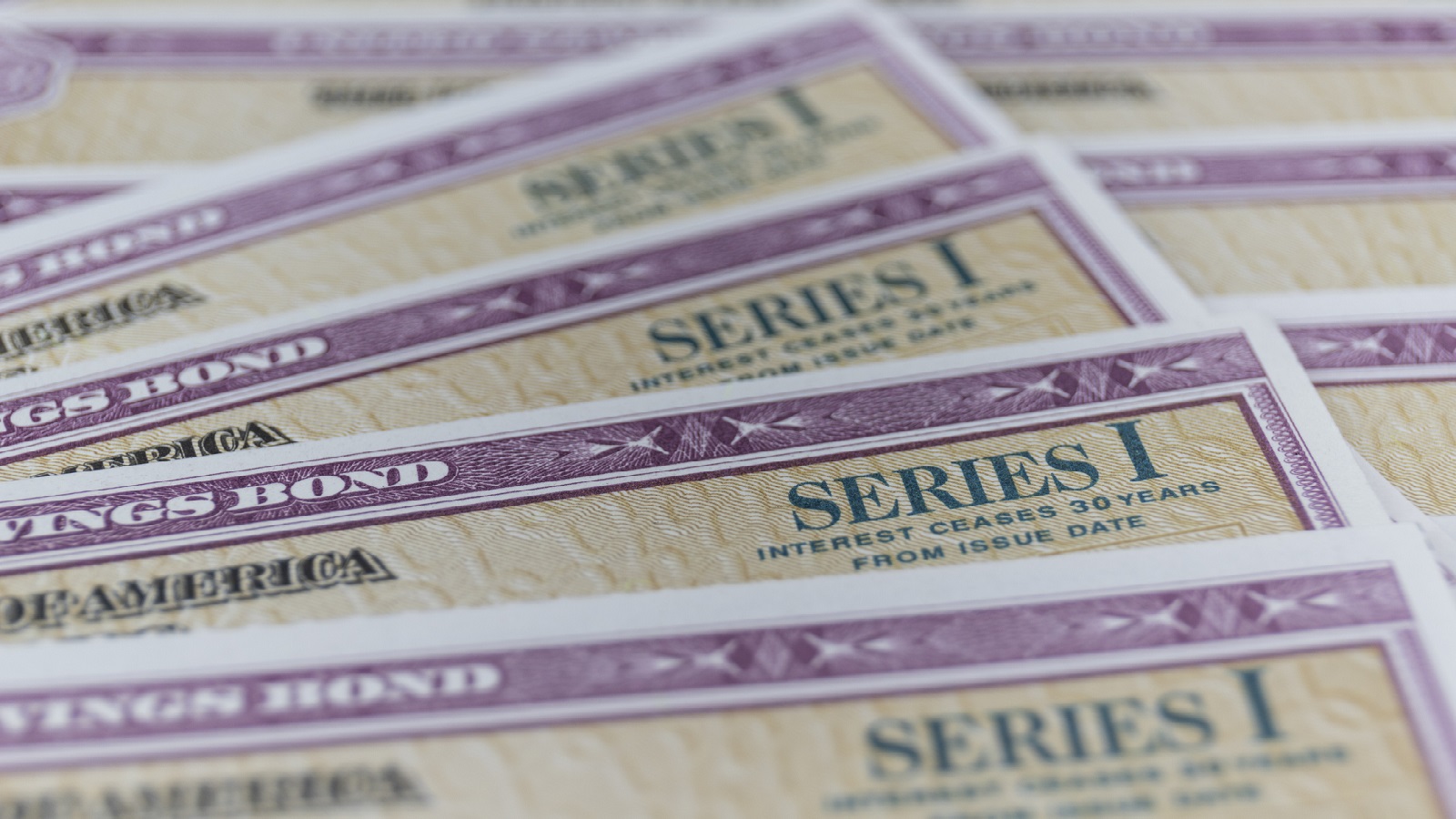Are I-Bonds a Good Investment? Pros and Cons
Learn about the pros and cons of investing in I-Bonds, U.S. savings bonds that protect your money from inflationary pressures.


Profit and prosper with the best of Kiplinger's advice on investing, taxes, retirement, personal finance and much more. Delivered daily. Enter your email in the box and click Sign Me Up.
You are now subscribed
Your newsletter sign-up was successful
Want to add more newsletters?

Delivered daily
Kiplinger Today
Profit and prosper with the best of Kiplinger's advice on investing, taxes, retirement, personal finance and much more delivered daily. Smart money moves start here.

Sent five days a week
Kiplinger A Step Ahead
Get practical help to make better financial decisions in your everyday life, from spending to savings on top deals.

Delivered daily
Kiplinger Closing Bell
Get today's biggest financial and investing headlines delivered to your inbox every day the U.S. stock market is open.

Sent twice a week
Kiplinger Adviser Intel
Financial pros across the country share best practices and fresh tactics to preserve and grow your wealth.

Delivered weekly
Kiplinger Tax Tips
Trim your federal and state tax bills with practical tax-planning and tax-cutting strategies.

Sent twice a week
Kiplinger Retirement Tips
Your twice-a-week guide to planning and enjoying a financially secure and richly rewarding retirement

Sent bimonthly.
Kiplinger Adviser Angle
Insights for advisers, wealth managers and other financial professionals.

Sent twice a week
Kiplinger Investing Weekly
Your twice-a-week roundup of promising stocks, funds, companies and industries you should consider, ones you should avoid, and why.

Sent weekly for six weeks
Kiplinger Invest for Retirement
Your step-by-step six-part series on how to invest for retirement, from devising a successful strategy to exactly which investments to choose.
During periods of high inflation like the one we've been living in, it can be a real challenge to find safe investments that will pay off without lagging the economy horribly.
This is when investments like Series I savings bonds, better known as I-bonds, come in.
However, there are some important things to learn before buying any, especially in terms of the pros and cons of these inflation-adjusted instruments.
From just $107.88 $24.99 for Kiplinger Personal Finance
Become a smarter, better informed investor. Subscribe from just $107.88 $24.99, plus get up to 4 Special Issues

Sign up for Kiplinger’s Free Newsletters
Profit and prosper with the best of expert advice on investing, taxes, retirement, personal finance and more - straight to your e-mail.
Profit and prosper with the best of expert advice - straight to your e-mail.
What are I-bonds and how do they work?
Bonds are fixed-income investments that basically amount to a loan, usually either to a government entity or a company. Thus, they come with set terms governing the regular payments, interest and time period.
Certain kinds of bonds are considered safe because you know exactly when and how much you're going to get paid. Buying U.S. Treasuries is considered the safest for bonds because they're backed by the full faith and credit of the U.S. government.
I-bonds are actually a form of bond issued by the U.S. Treasury, but they differ from the standard Treasury bonds.
What makes I-bonds unique compared to other types of bonds is that they provide a bit of protection against high inflation.
In addition to paying a fixed interest rate that the Treasury sets, I-bonds also pay an inflation-adjusted variable rate determined by changes in the inflation rate as measured by the Consumer Price Index (CPI).
The Treasury Department sets the interest rates for its I-bonds two times a year, on the first business days in May and November.
The rate of return on these bonds is a composite rate that combines their fixed and inflation-adjusted rates.
For example, the current I-bond rate for those issued between May 1 and October 31, 2025, will have an interest rate of 3.98%.
This includes the rate set by the Treasury Department, 1.10% plus the variable component based on the inflation rate.
The pros of investing in I-bonds
The headline benefit of I-bonds is the fact that their rates adjust for inflation, which is a massive advantage during periods of high inflation, although it becomes a disadvantage during periods of low inflation or deflation.
Additionally, I-bonds tend to earn higher returns than most investments during such periods, including the average stock. In fact, I-bonds often outperform many of the best-performing stocks as well during inflationary periods.
These Treasury-issued bonds generate high returns without all the risks of those other high-yielding investments because they're backed by the U.S. government.
Depending on the inflation rate, I-bonds can offer returns that are significantly higher than those of other low-risk investments like certificates of deposit (CDs) or high-yield savings accounts.
I-bonds are also attractive because investors bear almost no risk of losing their principal. The composite rate can never be less than 0%, even during deflationary periods when the inflation rate is negative.
All interest compounds, which also boosts your savings while your money is invested in I-bonds.
Finally, the income from I-bonds is sometimes exempt from tax for lower- and middle-income households that use it to pay for college tuition.
The cons of investing in I-bonds
Of course, no investment is perfect.
There's actually a limit on how much you can invest in I-bonds per year. The annual maximum in purchases is $10,000 worth of electronic I-bonds.
The option to purchase paper I-bonds ended in 2024. Buying paper I-bonds with your income tax refund is no longer possible as of January. However, tax filers will still be able to buy I-bonds online.
Another disadvantage to I-bonds is the fact that you have to purchase them directly from the Treasury via the website, TreasuryDirect.gov, which means you can't buy them through your brokerage with your other investments.
Because I-bonds are sold by the government, there's virtually no price or rate reporting, so you'll have to carefully track your purchases on your own without the help of a brokerage.
Further, I-bonds must be held for at least a year, so you won't be able to cash them out before a year is up if the rate plunges due to falling inflation.
In fact, you'll lose the last three months of interest if you redeem them before five years are up. Additionally, you won't be paid until you redeem them, so your investment is locked up until then.
Finally, the variable inflation-related component of the rate on I-bonds can make them pay nothing during periods of little to no inflation.
Bottom line
While it may seem like there are a lot of negatives to holding I-bonds, the positives may significantly outweigh them during times of high inflation. Of course, whether or not I-bonds are right for you depends on multiple factors.
For example, they probably aren't good for investors who need ready access to their funds because they're tied up for at least a year.
On the other hand, fixed-income investors who want a safe investment and think inflation will remain high may want to consider I-bonds.
However, those who think inflation will moderate might want to consider other types of bonds that may pay higher rates.
It may be a good idea to discuss your savings and investing goals with a financial adviser to determine whether I-bonds might make a good addition to your current portfolio.
Related articles
Profit and prosper with the best of Kiplinger's advice on investing, taxes, retirement, personal finance and much more. Delivered daily. Enter your email in the box and click Sign Me Up.

Jacob is the founder and CEO of ValueWalk. What started as a hobby 10 years ago turned into a well-known financial media empire focusing in particular on simplifying the opaque world of the hedge fund world. Before doing ValueWalk full time, Jacob worked as an equity analyst specializing in mid and small-cap stocks. Jacob also worked in business development for hedge funds. He lives with his wife and five children in New Jersey. Full Disclosure: Jacob only invests in broad-based ETFs and mutual funds to avoid any conflict of interest.
-
 Quiz: Do You Know How to Avoid the "Medigap Trap?"
Quiz: Do You Know How to Avoid the "Medigap Trap?"Quiz Test your basic knowledge of the "Medigap Trap" in our quick quiz.
-
 5 Top Tax-Efficient Mutual Funds for Smarter Investing
5 Top Tax-Efficient Mutual Funds for Smarter InvestingMutual funds are many things, but "tax-friendly" usually isn't one of them. These are the exceptions.
-
 AI Sparks Existential Crisis for Software Stocks
AI Sparks Existential Crisis for Software StocksThe Kiplinger Letter Fears that SaaS subscription software could be rendered obsolete by artificial intelligence make investors jittery.